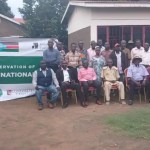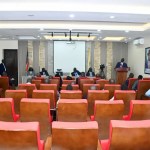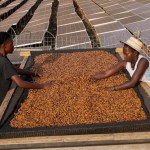South Sudan’s Revolving Door Politics Leave Citizens in the Dust
(JUBA) – If government jobs in South Sudan had expiry dates, they would likely be printed in hours, not years. The nation’s top leadership turnover is so dizzying that even flies whose life spans barely outlast a boda-boda ride from Custom to Konyo Konyo could brag of greater job security than some ministers.
This week, President Salva Kiir dusted off the sacking pen once again, relieving General Paul Nang Majok of his duties as Army Chief just seven months after appointing him. His replacement, General Dau Aturjong, now joins the roster of men tossed in and out of power faster than Juba weather changes from dust to downpour. Majok himself had replaced Santino Deng Wol.
In just five years, Kiir has chopped through a list that would make a butcher jealous. Over 20 ministers, six finance heads, two central bank governors and more than 30 high level officials have all been given the marching orders. Unpacking a suitcase in Juba is risky. You are better off living out of your bag, just like most internally displaced South Sudanese, though for vastly different reasons.
But this is not simply whimsical leadership. The real script lies deep in the SPLM’s DNA, a rebel movement turned ruling party so factionalised it resembles a goat market on a rainy day. Everyone is pulling in a different direction, and Kiir’s survival trick has been to juggle alliances like a magician with buttered hands. Appointments are strategic band aids. Reward one faction, muzzle another dangle a carrot here, yank a stick there.
One infamous example is the ballooning of South Sudan’s military brass to a staggering 700 generals. That is more generals than the army has tanks, or even working vehicles. In fact, it is not a military. It is a retirement scheme in uniform, a pensions club with AK-47s.
This bloated command structure was not an accident. It was a peacekeeping tactic, or more precisely, a peace buying tactic. Promoting local commanders kept militias quiet and warlords happy. But it turned the army into a top heavy pyramid that teeters on personal perks, not national priorities. In this theatre, loyalty outshines competence and ethnicity, especially Dinka connections, trumps talent every time.
The fallout has been a state that is allergic to governance. Schools crumble, roads vanish into thin air and hospitals operate on volunteerism. The only functioning systems are those that keep the ruling class fed both literally and financially.
Since the resumption of conflict in 2023, about 30,000 civilians have died, with nearly two million now displaced and over 2.3 million seeking refuge in Uganda, Kenya and Ethiopia. Even South Sudan’s own MPs operate remotely from Nairobi villas or Addis cafes. It is governance by Zoom, only without the Wi-Fi or decisions.
Meanwhile, the ruling elite are thriving. Unlike exiles from Uganda or Congo who struggle in foreign lands, South Sudan’s high flyers are swiping looted oil dollars to buy Nairobi mansions, send kids to private schools in Kampala and sip cappuccinos in Kigali. Why fix home when you can rent luxury abroad?
But even oil, South Sudan’s golden goose has stopped laying. Sudan’s own war disrupted export routes, and a pipeline leak last year left Juba’s cash tank dangerously empty. Suddenly, Kiir couldn’t print new generals or bribe old ones. The patronage machine coughed. And with so many unpaid expectations in uniform, the risk of mutiny grew thicker than the Juba air in July.
Who benefits from this chaos? Some say Riek Machar’s SPLM-IO likes the dysfunction as it keeps them shouting “marginalised!” without needing to take responsibility. Kiir’s clique is not too bothered either. Confusion is a handy excuse to avoid reform. It also feeds warlords, smugglers and contraband kings, who profit when order is just a rumour.
Take the East African Community, for example. South Sudan joined in 2016, despite lacking every requirement but a name. No working parliament, no revenue authority, no border control. Today, it owes over $20 million (≈92 billion SSP) in unpaid dues, yet continues to attend meetings as if all is well, often the most punctual at the buffet line.
Internally, nepotism has grown roots deeper than those of a Malakal mango tree. A common joke says to land a top civil service job, you need “an uncle in the army, a cousin in Cabinet and a bank account you can’t explain.” Performance reviews? Forget it. You are more likely to be judged on your clan’s wedding attendance than your policy skills.
This merry go round of misrule has real costs. Inflation is choking. A loaf of bread can cost a day’s wage. More than half of South Sudan’s children don’t attend school. In some hospitals, used needles are rinsed and reused. Farmers can’t plant, and more than 7 million go hungry.
Even worse, women bear the brunt. Many face sexual violence or are married off as teenagers just to reduce household mouths. Poverty blankets the country like a rainy season flood, with 92% of citizens living below the poverty line.
South Sudanese people deserve more than this. The revolving door of leadership, once just farcical, is now a national tragedy. Leadership should outlast bananas at Juba market, but alas, even the bananas are holding up better than most generals.
Until serious reform, real reform, not just reshuffling the same old cards is embraced, South Sudan’s story will remain the same. Different faces, same script. The country is buzzes with short lived ministers and long lasting pain. The flies may go, but the hunger, the displacement and the dysfunction remain.


















































